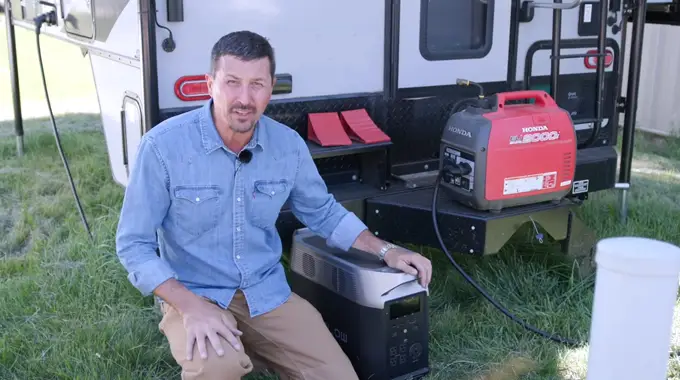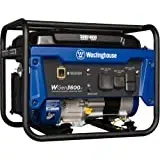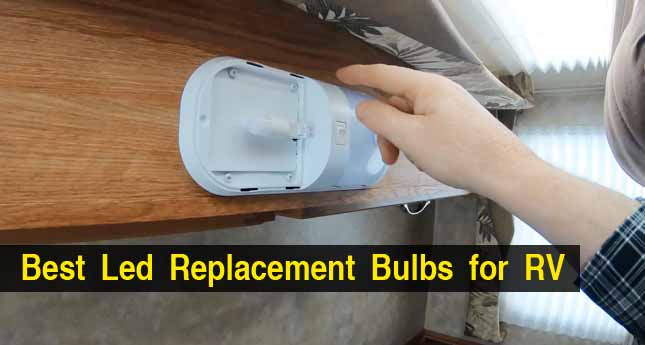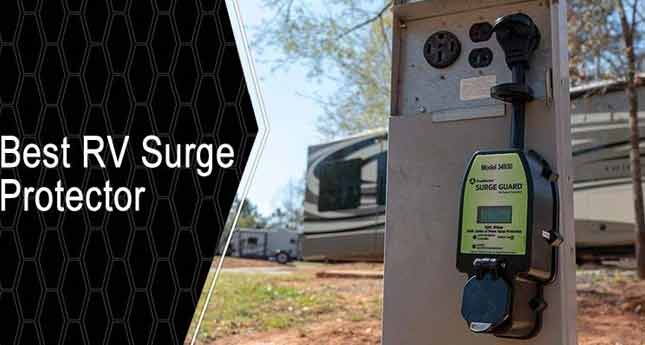Last Updated on September 25, 2023
As your RV batteries are used on a daily basis, they will eventually lose their charge. When this happens, you’ll need the best generator for charging RV batteries to get them going again.
A reliable generator will provide you with the peace of mind that your batteries will always be able to be recharged, regardless of where you are. There will be no power outages in the middle of nowhere.
When attempting to find a generator for this particular purpose, you need to avoid inferior or incompatible models, as these may not provide you with the results or power you desire.
Checking the reviews is a valuable way to get an accurate idea of what you need. You will then be able to determine which generators are worth your investment.


DuroMax 4000 Watt Gas Powered RV Camping Portable Generator
● Wattage: 4000 (peak) / 3300 (running)
● Engine Type & Displacement: 4-cycle air-cooled spark-ignition/208CC
● Fuel Type: Propane/gasoline
● Wheel Kit: Yes
● Weight: 90 Pounds
Best Generator for Charging RV Batteries Reviews : 5 Picks
There are a few reasons why you need to always check the reviews of the generator before choosing one for charging your RV battery. First, it is essential to ensure that the generator is compatible with your camper battery. Second, you need to verify that the product can provide enough power to charge your RV battery.
It is also necessary to check that the generator is safe to use and will not adversely affect your vehicle’s battery. Checking the reviews will allow you to ensure that you are purchasing the most suitable generator for your needs. Below are detailed reviews of the top 5 generators:
1. DuroMax 4000 Watt Gas Powered RV Camping Portable Generator

DuroMax designed this generator with RV and camping customers in mind and has included many features that make using and owning it a breeze.
Key Features:
- Hybrid design runs on either propane or gasoline
- Includes oil funnel for easy and clean oil changes
- Durable 208cc OHV engine for long-lasting power
- 4,000 peak watts / 3,300 running watts for heavy loads
- Provide clean power with low harmonic distortion
- Convenience voltmeter to monitor voltage output
- Automatically shuts off when oil levels are low
- Wheel kit and handles for easy portability
- Rugged build for rough use and weather conditions
- Operating quietly for minimal disturbance
- Multiple outlets for compatibility with a variety of appliances and tools
Multi Power Source:
The generator consists of a hybrid design, which means it can run on either propane or gasoline. This makes it a versatile option for different situations. Using the oil funnel included in the package, you can change the oil conveniently and without spilling any oil.
Quiet Operation:
No excessively loud sound comes from this generator so that it won’t bother anyone around you. You will find this useful when camping or tailgating.
Adequate Power Output:
Featuring 4,000 peak watts and 3,300 running watts, this model is well suited for powering heavy loads such as air conditioners and high-amperage power tools.
This product can be used both at home and in an RV. It is capable of providing sufficient power to run most electrical appliances as well as charge your RV battery. It also produces a clean form of power with low harmonic distortion. Your electronic devices will not be wrecked thereby.
Easily Readable Voltmeter:
There is a voltmeter on the power panel of this unit. You can thus monitor the voltage output and ensure that your electronics receive the necessary power.
Low Oil Shutoff Sensor:
This generator has the advantage of automatically shutting off when it detects low oil levels. You will be able to protect your investment and ensure that the engine will not run out of oil and cause malfunctions.
Easy Movable:
It is easy to move around due to the wheel kit and handles. No matter where you go, whether you are heading to a campsite or a construction site, you can take it with you.
Simple Set Up and Run:
There are clear instructions included with this generator on how to set it up and use it, as well as everything you will need to start using it. It also features a push-button start, so you don’t have to worry about fumbling with keys.
Due to its simplicity, it can be a viable option for those who do not have much experience with generators. All necessary hardware and tools are included, so you will not need to purchase anything separately.
All-Weather Friendly:
As it is built to withstand severe weather conditions and rough use, it can be helpful for camping, tailgating, or any other situation where an extra boost of power is required.
Limitations:
- Hiccups may occasionally occur in the engine.
- It doesn’t affect the generator’s performance.
- Some people may find the oil drain plug to be unsuitable due to its location in a relatively inconvenient spot.
- Once you have used it a few times, you will become familiar with it. This is not a major concern.
Verdict:
Based on the low noise operation, portability, clean power output, and safety features, the DuroMax 4000 Watt gas powered RV camping portable generator can be a smart choice for RV owners and campers in need of a reliable and powerful generator.
2. Westinghouse WGen3600v Portable Generator
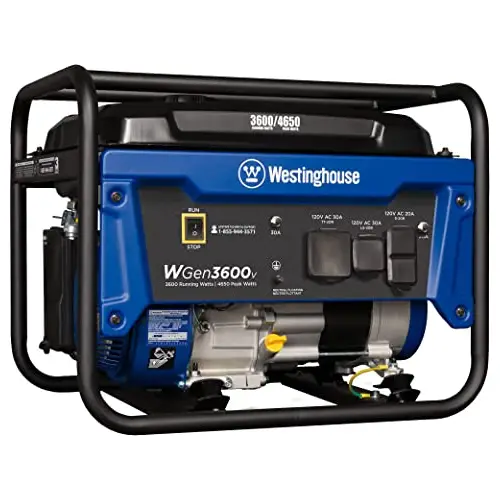
This generator from Westinghouse offers you the optimum power solution during any emergency or leisure activity. With the 212CC 4-stroke OHV engine, you will have continuous running power of 3600 watts and peak power of 4650 watts.
Key Features:
- Circuit breaker protection that ensures the safety of the electronics
- 3600 Running Watts and 4650 Peak Watts
- Recoil start for easy starting
- 4-gallon fuel tank capacity for long run times
- Multiple ports with rubber covers for safety
- Long-lasting cast iron sleeve with automatic low oil shutdown
- Two fuel sources for versatility and convenience
- Fuel gauge for easy viewing of remaining fuel
- Quiet and low emissions
Easy-to-understand Labels:
The on/off switches, ports, and other features of this model are clearly labeled, so you can easily locate them. With a good understanding of each function, you will be able to use it easily.
Circuit Breaker Protection:
You will find circuit breaker protection on the circuit board, ensuring your electronics’ safety. You will thus feel secure knowing that your devices are well-protected.
Multiple Ports:
As it has multiple ports, it is easy to connect multiple devices simultaneously. The extra wall outlet ports are a valuable addition for connecting additional devices.
You can easily connect and charge your RV batteries with the RV-ready port if you plan to go camping. It is good that all outlets have rubber covers that provide an extra level of safety.
Durable Cast Iron Sleeve:
You can expect a long lifespan from this generator due to its cast iron sleeve with automatic low oil shutdown.
Two Fuel Sources:
There are two alternative fuel sources available with the Westinghouse WGen3600v portable generator, making it an extremely versatile and reliable piece of equipment. If gasoline runs out, you can switch to propane, so you will never have to worry about losing power.
Convenient Fuel Gauge:
The fuel gauge is one of the most useful features of this product. This allows you to view the remaining fuel in the tank so that you can plan accordingly.
User-friendly:
This RV generator is both user-friendly and well-built, so you can assume it will work when needed. You can quickly obtain power in an emergency with this unit because it is easy to assemble and start-up.
Quiet and Low Emissions:
Due to its quiet nature, there is no need to worry about disturbing your neighbors. It emits low emissions, so you can use it without harming the environment.
Included Necessary Equipment:
You will find almost everything you need to get started, including oil, an oil funnel, a tool kit, and a user’s guide. If you need these items, you will no longer need to spend time searching for them.
Limitations:
- There is no wheel kit included with the product, which would make it more convenient to move around.
- Due to its compact size and portability, you will not have to exert too much effort to move it.
- It is also possible to add an additional wheel kit to solve this problem.
- Oil leaks may occur from the generator for some users.
- A bead of gasket sealant can be applied to the crankcase gasket at the bottom of the oil pan to resolve this issue. The bottom crankcase bolts may also be removed, and a gasket seal applied to each one before reinstalling.
Verdict:
This generator can be of interest to you due to its easy-to-use features, long lifespan, circuit breaker protection, quiet operation, multiple ports, and fuel gauge.
3. WEN Open Frame Inverter Generator

Those who require reliable power in an emergency can benefit from the WEN generator. Due to its inverter technology, it is safe for sensitive electronics, and its open frame design allows heat to dissipate.
Key Features:
- Open frame design dissipates heat quickly
- Long-running time on a single tank of gas
- The overload reset feature protects appliances and circuits
- RV-Ready port for easy connection to an RV or camper
- USB port for charging small devices
- Lightweight and portable for easy transportation
- Eco mode conserves fuel and reduces emissions
- The parallel-ready panel allows you to connect any two WEN inverter
- Generates clean power to operate sensitive electronics safely
Long Run Time:
With a single tank of gas, it can run for a long period of time, which makes it very economical. It is also simple to set up and use. This generator provides consistent power and runs smoothly.
Overload Reset Option:
The overload reset feature of this generator helps prevent damage to your appliances and circuits. You will be able to enjoy peace of mind knowing that your electronic devices are protected.
Necessary Ports:
With its RV-Ready port, you can easily connect it to your RV or camper, and the USB port allows you to charge your smartphones and other small devices.
Good Power Output:
A 4-stroke engine with 212 cubic centimeters of displacement powers this generator. It is also CARB-compliant, making it a safe and eco-friendly option. There is a surge output of 4000 watts and a rated output of 3500 watts.
Lightweight:
Due to its lightweight and easy portability, it is suitable for camping, tailgating, or RVing. It can be used as an emergency backup power source for your home or business.
Eco Mode:
One of the most popular features of this generator is its eco mode. When activated, the eco mode automatically adjusts the engine speed to match the load, resulting in less fuel consumption and lower emissions.
Parallel-Ready:
You can connect two WEN inverter generators together for even greater power with this generator’s parallel capability.
Limitations:
- The fuel tank may appear to be somewhat small.
- It is sufficient to provide approximately seven hours of use. You can easily charge your RV battery.
- The sound level of this generator is slightly higher.
- It will not disturb your surroundings too much. A noise-reducing muffler can be used to solve this problem.
Verdict:
Choosing the WEN open frame inverter generator can be beneficial due to its length of run time, clean power output, portability, and eco mode. These features make it a viable option for consumers who require reliable power during an emergency.
4. BILT HARD RV Ready Inverter Generator

BILT HARD’s inverter generator is equipped with a variety of features to help you get the power you need when driving.
Key Features:
- Foldable handle and wheels for easy transport
- Produces a pure sine wave which is safe for delicate electronics
- Electronic overload protection system for safety
- Oil alert system to shut down generator when oil is low
- Super quiet 68 dB operation
- Fuel gauge that allows monitoring fuel level
- The fuel shutoff feature maximizes generator life
- Inverter technology for safe use with sensitive electronics
- Auto voltage adjuster help maintain stable power
Foldable Handle and Wheels:
As this generator is lightweight and portable, you can easily take it with you wherever you go. The foldable handle and wheels make it easy to move around.
Pure Sine Wave Power Curve:
You can use it with delicate electronics because it produces a pure sine wave. Due to the RV-ready design, it can charge your RV battery and power the RV’s electrical system.
Overload Protection and Oil Alert:
It is equipped with an electronic overload protection system that shuts the unit down in the event of overload. As soon as the oil level drops below a certain level, the oil alert system will shut down the unit.
Enough Wattage:
With 3400 rated watts and 4000 peak watts, this generator can power appliances and electronics. You can be confident that this generator will deliver the power you need when you need it.
Annoying Noise-Free:
Since it is quiet, you will not need to be concerned about disturbing your neighbors while you are camping. You can just relax and enjoy the beautiful outdoors without worrying.
Easy to Read Fuel Gauge:
Featuring an easy-to-read fuel gauge, you can always monitor the fuel level and avoid running out.
Fuel Shutoff Function:
It has a fuel shutoff feature that uses up the carburetor’s remaining fuel before shutting down, maximizing generator life.
Multiple Ports:
You will find two 120V 20 Amp outlets, a 12V 8A DC output, and a 12V DC cigar lighter. There are also two USB ports for charging mobile phones and other electronic devices.
Limitations:
- This generator may have a little bit of a short runtime.
- It will still be sufficient to charge your RV’s battery.
- The generator is manually started, so you will need to pull the starter fast several times to get it started.
- Upon starting, it will run smoothly, so this is not a significant issue.
Verdict:
You may consider the BILT HARD RV ready inverter generator if you are looking for a portable, lightweight, and quiet generator that can power your RV and other sensitive electronics. With its many features, it can be a wise choice for campers and RVers.
5. A-iPower 4000 Watt Dual Fuel Inverter Generator

A-iPower’s generator gives you the advantage of using either gasoline or propane to power your generator. Those who wish to use either fuel source will find this a very useful feature.
Key Features:
- Gasoline or propane fuel options are available
- It has a meter to track the number of hours in use
- Includes electric start and remote control operation
- Uses inverter technology to produce clean power
- Generates 4,000 watts of power (gasoline) or 3,500 watts (propane)
- Low idle technology for extended run time
- Folding handles and wheels for easy portability
- Low oil alert light and low oil automatic shutdown
Tracking Meter:
A meter is included to keep track of the number of hours that the generator has been in use. This is a nice addition that you will not typically find on other models.
Remote Control:
For electric starts, the remote control operation is available. This is a valuable option, especially if you’re using the generator at night.
Safe to Use:
Inverter technology is used in this generator to produce clean power. It means that there is no risk of harming your laptop, cell phone, or other sensitive electronic devices.
Enough Power:
With gasoline, it produces 4,000 starting watts and 3,500 running watts, while in the case of propane, it produces 3,500 starting watts and 3,200 running watts. You can use it to charge your RV battery, run your home appliances, or serve as a backup power source in the event of a power outage.
Extended Runtime:
Featuring A-iPower’s “Low idle” technology, it can operate for up to seven hours at 50% load on a single propane tank.
Easy to Move On:
Due to the folding handles and wheels, it is easy to move. It can be taken camping, tailgating, or anywhere else you need power on the go.
Limitation:
- After prolonged use, the included battery may weaken.
- A pull start or push button can still be used to start the generator if necessary, so this is not a serious issue.
- If you wish, you can also purchase a better quality battery to use with the generator.
Verdict:
In terms of overall features and performance, you may wish to consider the A-iPower 4000 watt dual fuel inverter generator.
Best Generator for Charging RV Batteries Comparison Chart:
| Product Name | Wattage | Engine Type & Displacement | Fuel Type | Wheel Kit | Weight |
| DuroMax XP4000S Portable Generator | 4000 (peak) / 3300 (running) | 4-cycle air-cooled spark-ignition/208CC | Propane/gasoline | Yes | 90 Pounds |
| Westinghouse Portable Generator | 4650 (peak) / 3600 (running) | 4 stroke / 212 CC | Propane/gasoline | No | 98.8 pounds |
| WEN GN400i Generator | 4000 (surge) / 3500 (rated) | 4 stroke / 212 CC | Gasoline | No | 66.1 Pounds |
| BILT HARD Inverter Generator | 4000 (peak) / 3400 (rated) | 4 stroke / 212 CC | Gas | Yes | 104.8 pounds |
| A-iPower SUA4000iED Portable Inverter Generator | 4,000 (starting) / 3,500 (running) with gasoline & 3,500 (starting) / 3,200 (running) with propane (LPG) | 4 stroke / 223 CC | Propane/gasoline | Yes | 124.7 pounds |
Factors to Consider When Choosing the Best Generator to Charge RV Batteries
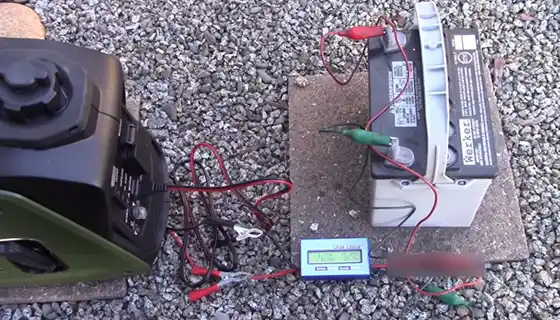
It is important to take several factors into account when choosing a generator to charge your RV battery. Due to the wide variety of generator types and models available on the market, it can be confusing to select the most appropriate one for your needs.
Considering the following aspects will help you narrow down the choices and determine which generator is optimal for your needs.
1. Power Output
RV batteries need to have a certain power output to charge efficiently. Watts are typically used to express the power output. A generator with a higher wattage rating is considered to be more powerful.
You can charge your RV battery faster with a generator that is rated at a higher wattage than a low-wattage generator.
To find out how much wattage your generator produces, you will need to consult the owner’s manual. Through a search of the model number online, you can also determine the wattage rating.
2. Fuel Type
The most common fuel types used in generators are gasoline and propane. Some models can use gasoline and propane, while others may only be able to use one fuel type. Regarding which fuel type is better, it depends on your personal preferences.
If you’re not sure what fuel type the generator supports, there are a few ways to find out. First, consult your generator’s owner’s manual. It is the best source of information regarding your specific model.
You can contact the manufacturer directly if you cannot locate your owner’s manual or if it does not contain the information you are seeking. They should be able to tell you what fuel type is supported by your generator model.
Alternatively, you can check the label on the fuel tank of your generator if you are still unsure. This should list the types of fuel that can be used.
3. Engine Type and Displacement
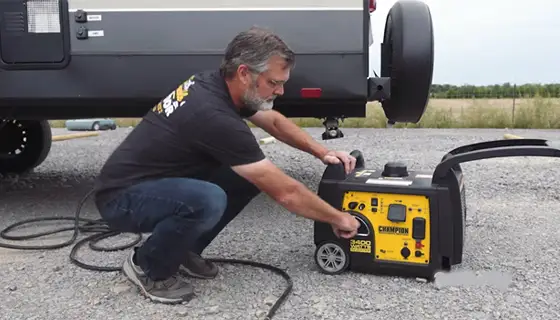
When choosing a generator for your RV, it’s important to consider both the engine type and displacement. The engine type will determine how fuel efficient the generator is, while the displacement affects the overall power output.
A generator with a four-stroke engine is typically more fuel efficient than a generator with a two-stroke engine. Displacement is measured in cubic centimeters (cc), and generally speaking, the higher the cc rating, the more powerful the generator.
The owner’s manual or the manufacturer can provide engine type and displacement information.
4. Fuel Tank Capacity
The fuel tank’s capacity is an important consideration when selecting a quality generator. A larger fuel tank will allow the generator to run longer without refueling, which can be helpful when power is needed for an extended period.
It is also important to consider the size of the generator’s fuel tank about the size of the RV’s battery. Suppose the generator features a large fuel tank. In that case, multiple RV batteries can be charged simultaneously, whereas a generator with a smaller fuel tank is only capable of charging one RV battery.
Selecting a generator with the appropriate fuel tank capacity can help ensure that RV batteries are properly charged and ready to use when needed.
5. Portability
A generator’s portability is another key consideration. When you are on the go, a generator that is easy to set up and move will make it much easier to keep your RV batteries charged.
It is advantageous to choose a generator with wheels and a handle since this will facilitate transport. Some generators are designed to be lightweight and compact but do not include wheels or handles.
You will be able to ascertain which type of generator is most appropriate to charge your RV batteries based on your needs.
6. Noise Level
The generator’s noise level should also be considered. Some generators produce a considerable amount of noise, which can be disruptive when trying to enjoy the peace of the great outdoors.
RV generator manufacturers have recently made models that operate at a lower noise level. It is important that you pay attention to the decibel rating. This is a measure of how loud the sound is.
A higher decibel rating indicates a louder sound. You can find the decibel rating of a generator in the owner’s manual or on the manufacturer’s website. Sometimes the decibel rating is labeled on the generator itself.
7. Fuel Consumption
When you are looking for a generator to charge an RV battery, fuel consumption is an important consideration. You want to choose a generator that is fuel efficient so that you can save money and reduce emissions.
Fuel efficiency is typically measured in gallons per hour (GPH). The GPH rating of a generator indicates how much fuel it consumes in an hour. A generator’s GPH rating can be found in its user manual or on the manufacturer’s website.
How to Charge an RV Battery with a Generator?
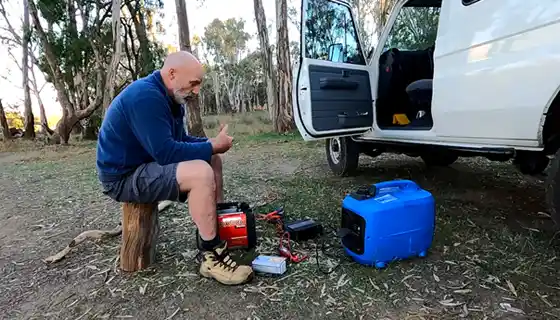
For battery charging, ensure the generator has been properly fueled and started. Allow the engine to warm up and stabilize the voltage output for a few minutes.
Once the generator runs smoothly, you can connect the charger’s alligator clips to the RV battery terminals. Ensure that the battery connections are secure before proceeding. Attach the red clip to the positive terminal and the black clip to the negative terminal.
After connecting the alligator clips, you can plug the battery charger into the RV-ready outlet shore power. The generator will automatically begin charging the RV battery bank. It is important to keep an eye on the charging process to ensure that the battery is being charged properly.
As soon as the battery has been fully charged, the generator should be turned off and the charger disconnected. Finally, remove the alligator clips from the battery terminals.
Factors That Affect Charging Time
There are several factors that can affect the length of time it takes for a generator to charge an RV battery. These include:
The Capacity of The Batteries
It is one of the primary factors that determine how long it will take to charge. A higher-capacity battery will take longer to charge than a lower-capacity battery.
The capacity of a battery is measured in amp-hours (Ah). The Ah rating is the number of amps that a battery can provide for an hour before it needs to be recharged.
An RV battery’s capacity determines how long it will last before it needs to be recharged. A higher capacity battery will last longer than a lower capacity battery, and will therefore require less frequent charging. For example, a 100 Ah RV battery will provide 1 amp for 100 hours, or 10 amps for 10 hours.
Depth of Discharge (DOD)
When deciding how long to charge your RV battery, it’s important to consider the Depth of Discharge (DOD). Put simply, this is the measurement of how much power has been drained from the battery.
A battery with a high DOD will take longer to charge than one with a low DOD. The reason for this is that a high DOD means that there is more work for the charger to do in order to bring the battery back up to full power.
If you have a high DOD battery, it’s important to be patient and allow it plenty of time to charge. On the other hand, if your lead acid battery has a low DOD, it will charge relatively quickly. In general, it’s best to err on the side of caution and give your batteries sufficient recharge time, regardless of their DOD. By doing so, you’ll ensure that they’re always ready to go when you need them.
The Output of The Generator
Output from the generator is one of the key factors that determine battery charging time. While a higher output will obviously result in a faster charge, there are other factors to consider as well. For example, if the RV is equipped with a voltmeter, make sure to keep an eye on it during charging.
If the voltage begins to drop too low, it could indicate that the battery isn’t being charged properly and may need to be replaced. It’s also important to make sure that the generator is running at its rated speed, if it’s running too slow, it won’t produce enough power to properly charge the battery.
What Appliances are Running
The time it takes to charge your RV battery will depend on the number of appliances you are running and the type of battery you have. If you are only running a few appliances, such as a fridge and a TV, then your battery will charge relatively quickly.
If you are running multiple appliances, such as lights, water pump, furnace, etc. Therefore, it will take longer to recharge your battery. Your battery type will also affect how quickly it charges.
Lithium batteries tend to charge more quickly than lead-acid batteries, for example. Ultimately, the amount of charging time will vary depending on your specific circumstances.
Number of Batteries Being Charged
When it comes to recharging batteries, the quantity of batteries being recharged is an important factor to consider. If only one battery is being charged, it will obviously take less time than if multiple batteries are being charged simultaneously. This is because each battery bank must be individually charged in order to reach full capacity.
The type of charger being used can also affect charging time. For example, a standard charger will take longer to charge a lithium battery than a premium charger.
Ultimately, the number of batteries being charged is a key determinant of how long it will take to recharge them. By taking this into account, individuals can ensure that their batteries are properly charged in a timely manner.
Frequently Asked Questions:
A few questions are commonly asked about RV battery generators. These questions and their answers are provided below.
1. How long to charge rv battery with generator?
Most generators are designed to charge the RV’s 12-volt battery in about 10 hours or less. If it’s almost full, it could take just 2 hours to reach full capacity. Ultimately, it depends on a variety of factors.
This time will vary depending on the power output of the generator and the type of battery being charged. For example, a generator with a higher power output will charge the battery more quickly than a lower generator power output.
The condition and battery life will also affect the charging time. A brand new battery will likely charge more quickly than an older battery in poor condition.
It is also important to note that the battery charger being used will affect the charging time. A charger with higher amps charges your motor house batteries more quickly than chargers with lower amps.
2. What size generator to charge an RV battery?
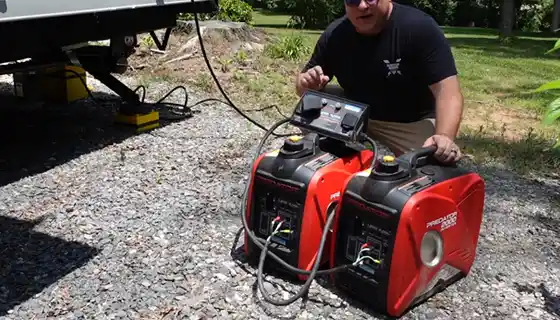
To fully charge your 12 volt RV deep cycle battery, you will need a generator with a 3,500-watt capacity and 8 amp power. For a quicker battery charge, you may want to opt for a generator with a 4,000-watt capacity. Whichever option you choose, follow the manufacturer’s instructions carefully to avoid adversely affecting your battery. It will thus be able to live a longer life.
3. How do I know if my RV battery is charging with a generator?
You can determine whether your RV battery is being charged in several ways. First, you can check the voltmeter on the generator itself. Most portable generators have a voltmeter that will show you the voltage output of the generator. If the generator is outputting voltage, then it is likely that the RV battery is being charged.
You can also check the condition of the RV battery itself. When a battery is charging, it will feel a little warm to the touch. You will notice that the battery is cool to the touch if it is not charging. Finally, you can check the battery charger itself. Most chargers have a light that indicates when the battery is being charged. The RV battery is charging if the light is on.
4. Can I use a regular generator to charge RV batteries?
A regular generator can technically be used to charge RV batteries, but there are a few things to keep in mind. First, the size of the generator is important. A 1000-watt generator is usually sufficient for a small RV, but if you need to run major systems like air conditioning, you’ll need a bigger generator.
Next, the state of the battery is important. If the battery is very low, it may not be able to take a full charge from the generator.
Lastly, how the generator is being used in the RV is also important. If the generator is being used to power other systems while also charging the battery, it may not have enough power to do both effectively. Therefore, it’s important to consider all of these factors before hooking up a generator to charge an RV battery.
5. Why is my generator not charging my RV battery?
This could be caused by a number of factors. First, make sure that the generator is turned on and that the circuit breaker is in the “on” position. If the generator is on but the circuit breaker is off, it won’t be able to charge the battery.
Check to see whether the generator is properly grounded. If it’s not, it could be causing an electrical issue that’s preventing the battery from being charged.
Also, it’s possible that the battery itself is faulty and needs to be replaced. If you’ve checked all of these things and the generator still isn’t charging your RV battery, it’s best to consult with a certified RV technician. They’ll be able to diagnose the problem and get your generator up and running again.
6. Can you recharge an RV battery with an inverter generator?
You can use an inverter generator to recharge RV batteries. In fact, this is a great way to keep your RV battery charged while you are on the road.
An inverter generator converts AC power into DC power, which is what your RV battery needs to recharge. You can connect the inverter generator directly to the battery or use a charging station.
If you are using a charging station, be sure to read the instructions carefully so that you do not overcharge the battery. When charging the battery, it is important to monitor the voltage level and stop charging when the voltage reaches its peak.
Overcharging can damage the battery and reduce its lifespan. Therefore, it is crucial to be careful when using an inverter generator to recharge an RV battery.
7. Will a 2000-watt generator charge RV batteries?
The answer depends on the size of your RV battery. A 2000-watt generator should be able to charge a 12-volt RV battery in about 10 hours. If you have a larger RV battery, you may need a higher-wattage generator.
To be on the safe side, choose a generator with slightly more power than you think you need. That way, you’ll be sure to keep your batteries charged and avoid any potential problems down the road.
For example, if you have a 24-volt RV battery, you will require a 3000-watt generator to charge it in 10 hours. Or, if you have two 12-volt batteries, a solar generator of 4000 watts will be needed to power them both in 10 hours.
So, when choosing a generator for your RV, be sure to take into account the size of your batteries and choose accordingly. With a bit of planning, you can ensure that your RV batteries will always be charged and ready to operate.
Can a Solar Battery Charger for Dump Trailers also Charge RV Batteries?
Yes, a top solar battery charger for dump trailers can also charge RV batteries. These versatile chargers are designed to be compatible with different types of batteries, including those found in RVs. With the right solar charger, you can efficiently harness the power of the sun to keep your RV batteries charged on the go.
Conclusion
After checking out all the products we reviewed, you can compare their features and limitations. We hope that you will be able to find the best generator for charging RV batteries according to your specific needs.
You’ll also be able to make a better decision if you consider the factors we mentioned. This will allow you to choose the appropriate product and get the most out of it.
Be sure to use the generator properly to prevent any malfunctions. To safely and efficiently charge your RV battery, you can follow the procedure we have provided. You can also follow the user manual for more guidance.
- Plenty of Power – With 4,000 peak watts and 3,300 running watts, this unit can handle heavy loads,…
- Powerful Engine – The DuroMax 208cc OHV engine is a workhorse that provides plenty of power to…
- Low Oil Shutoff – Protects your investment by automatically shutting the generator off when it…
Last update on 2025-07-05 / Affiliate links / Images from Amazon Product Advertising API

